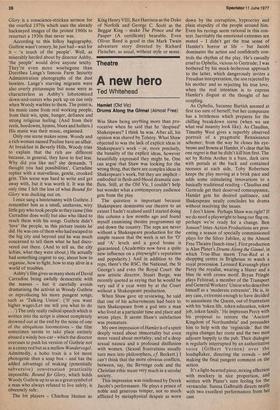Theatre
A new hero
Ted Whitehead
Hamlet (Old Vic) Drums Along the GInnel (Almost Free) Was Shaw being anything more than provocative when he said that he 'despised' Shakespeare? I think he was. After all, his opinion was shared by Tolstoy. What Shaw objected to was the lack of explicit ideas in Shakespeare's work — or, more precisely, the banality of the explicit ideas, however beautifully expressed they might be. One can argue that Shaw was looking for the wrong thing, that there are complex ideas in Shakespeare's work, but they are implicit — embodied in flesh-and-blood dramatic conflicts. Still, at the Old Vic, I couldn't help but wonder what a contemporary audience gets from the play.
The question is important because Shakespeare dominates our theatre to an extent I hadn't realised until I started doing this column a few months ago and found myself examining theatre programmes up and down the country. The reps are never without a Shakespeare production for the simple reason that the work is set for '0' and 'A' levels and ra good house is guaranteed. (Academics now have a quite new influence on a playwright's reputation and popularity.) And in addition to the reps, there's the RSC, the National, the St George's and even the Royal Court: the new artistic director, Stuart Burge, was recently quoted as saying that he would be very sad if a year went by at the Court without a Shakespeare production.
When Shaw gave up reviewing, he said that one of his achievements had been to turn Shakespeare from a god into a man who lived at a particular time and place and wrote plays. It seems Shaw's satisfaction was premature.
My own impression of Hamlet is of a spirit deeply vexed about immortality but even more vexed about mortality; and of a deep sexual nausea and a profound disillusion with women. (Sexual frustrations usually turn men into philosophers, cf. Beckett.) I can't think that the more obvious conflicts, between, say, the Revenge code and the Christian ethic mean very much in a secular society.
This impression was confirmed by Derek Jacobi's performance. He plays a prince of noble and generous temper, not so much afflicted by metaphysical despair as worn down by the corruption, hyprocrisy and plain stupidity of the people around him. Even his ravings seem rational in this context. Inevitably the emotional extremes are muted — I didn't get the true sense of Hamlet's horror at life — but Jacobi dominates the action and confidently controls the rhythm of the play. He's casually cruel to Ophelia, vicious to Gertrude; I was bothered by his mock-lecherous approach to the latter, which dangerously invites a Freudian interpretation, the son rejected by his mother and so rejecting his true love, when the real intention is to express Hamlet's disgust at the thought of her coupling.
As Ophelia, Suzanne Bartish seemed at first too sure of herself; but her compusure has a brittleness which prepares for the chilling breakdown scene (when we see what real insanity look like). As Claudius, Timothy West gives a superbly observed portrait of a pragmatic Renaissance schemer; from the way he closes his eyebrows and frowns at Hamlet, it's clear that his one regret is that he didn't kill him first. The set by Robin Archer is a bare, dark cave with portals at the back and contained recesses at each side. Toby Robertson keeps the play moving at a brisk pace and adds some stimulating innovations to a basically traditional reading — Claudius and Gertrude get their deserved comeuppance, Hamlet gets his desired quittance, and Shakespeare neatly concludes his drama without resolving the issues.
I don't know. Perhaps Shaw was right? If we do need a playwright to hang our flag on, perhaps we're ready for a change. Ben Jonson? Inter-Action Productions are presenting a season of specially commissioned plays for the Silver Jubilee, 4 the Almost Free Theatre (lunch-time). First production is Alan Plater's Drums Along the Ginnel, in which True-Blue meets True-Red at a shopping centre in Brighouse to watch a royal procession. Leonard Kavanagh plays Percy the royalist, wearing a blazer and a blue tie with crown motif. Bryan Pringle plays Felstead, a member of the Transport and General Workers' Union who describes himself as a 'moderate extremist'. He is, in any case, extremist enough to have decided to assassinate the Queen, out of frustration with his 'token life, token education, token job, token family.' He impresses Percy with his proposal to restore the 'Ancient Kingdom of Northumbria' and persuades him to help with the 'reginicide: But the regina changes her route and the two men adjourn happily to the pub. Their dialogue is regularly interrupted by an authoritative voice (Gilbert Vernon) over the loudsptaker, directing the crowds — and making the final pungent comment on the action.
It's a light-hearted piece, mixing affection with mockery in nice proportion, and written with Plater's sure feeling for the vernacular. Suresa Galbraith directs neatly with two excellent performances from her cast.


































 Previous page
Previous page